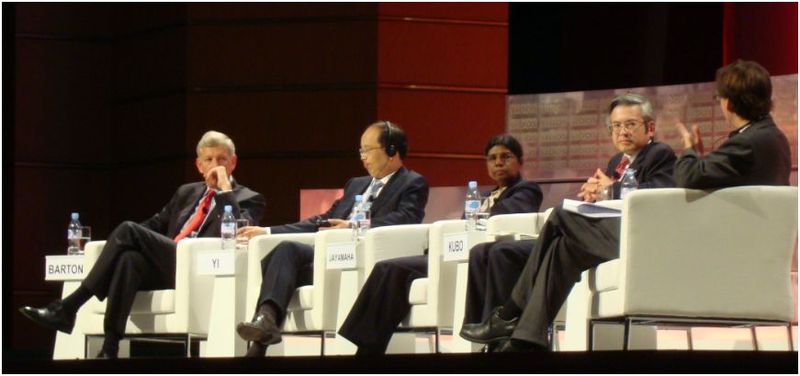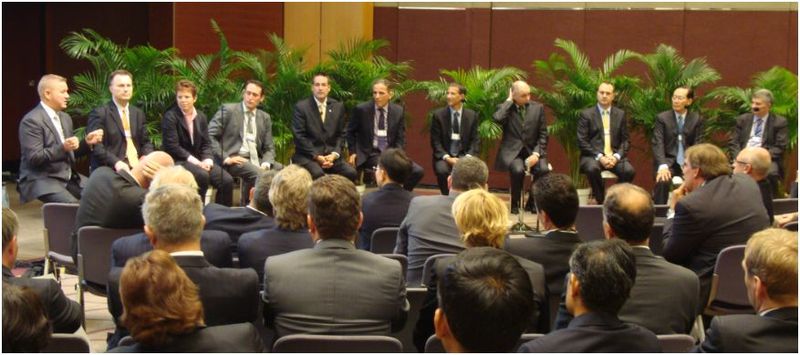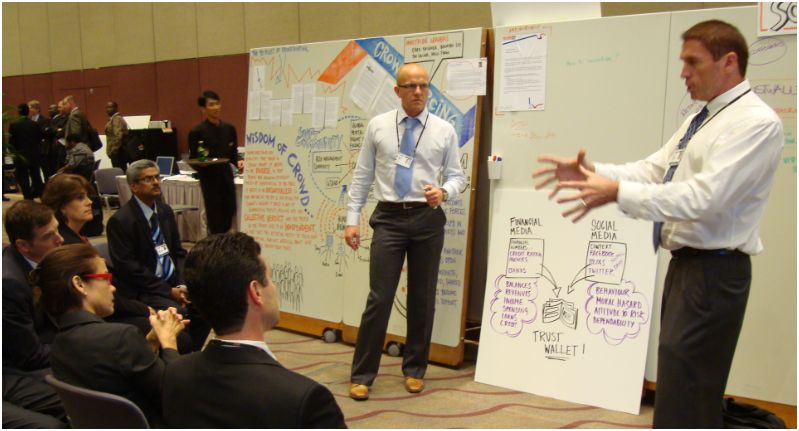
Not surprisingly I’ve now turned in from the conference for the day absolutely knackerood.
After the 10k marathon of going up and down from ground to third floor and back all day, between the two exhibit halls, conference rooms, plenary and breakout sessions, toilets and you name it, me feet are falling off.
Not that I’m complaining as it’s been a good day.
After the McKinsey session, I went along to the plenary on whether Asia would be the powerhouse for the next century. This was an excellent panel of luminaries including:
- Dominic Barton, Worldwide Managing Director, McKinsey & Company;
- Tetsuya Kubo, Senior Managing Director, Sumitomo Mitsui Banking Corporation;
- Huiman Yi, Vice President, Industrial & Commercial Bank of China (ICBC);
- Ranee Jayamaha, Advisor to the President on Banking, President Secretariat, Central Bank of Sri Lanka;
and moderated by David Pilling, Editor for the Financial Times, Asia.
The gist of the session was whether the Asian economies would create growth for the future and the panel seemed to be reasonably optimistic. The thorn in this optimism is where the demand will come from however. For many moons we have talked about the BRIC economies creating the next billion consumers, but Asian consumers don’t consume. They save.
These savings created the global imbalance in the current crisis where there is a capital excess in China and its siblings and a debt excess in the Western economies.
How do you solve this when the Asian mentality is to save? As Ronnie Chan mentioned yesterday, “when China has enjoyed 3,000 years of frugality as a culture, you aren’t going to change this overnight”.
So true.
But then Dominic Barton of McKinsey (again!) is a bull optimist when it comes to Asia driving a wave of future economic growth. He believes it just needs the consumer to be ‘ignited’.
David Pilling asked him how that would happen when the last crisis in Asia in 1997 had net exports at 37% of GDP but, by the start of this crisis a decade later, it had risen to 47% reinforcing the view that Asian save rather than spend.
Dominic retorted that there are 900 million new middle class consumers entering Asian society by 2015 and that 2015 ain’t that far away. As a result, “if you don’t have a footprint in Asia by the end of the next decade, your institution will be irrelevant”.
Interesting, and it reinforces research I produced for Misys three years ago that predicted the top ten banks of the world would be half Asian by 2010. This has already come true with Mr. Yin’s bank, ICBC, the largest bank in the world by deposits and market capitalisation today.
Woo-hoo.
After this session, it was down to innotribe to talk about cloud computing.
This session was led by my colleague Peter Hinssen of A-Cross Technology and a panel of cloud vendors:
- Joe Weinman, Strategy & Business Development VP, AT&T
- Jeffrey Barr, Senior AWS Technology Evangelist, Amazon Web Services
- Willy Chiu, Vice President of IBM Cloud Labs & High Performance On-Demand Solutions
- Philippe Coullomb, facilitator, The Value Web
- Russell Daniels – Vice President and Chief Technology Officer, EDS, Hewlett Packard
- Nick Davies, Global CTO, Lombard Risk Management
- Amir Halfon, CTO Global Financial Services, Sun Microsystems
- Stephen Morse, Senior Director - Sales Engineering APAC, Salesforce.com
- Clare Porter - Senior Vice-President - Technology Solutions, Sungard
- Roland Slee, VP Banking & Capital Markets, Oracle Asia Pacific
- Neil Vernon, Senior Product Manager, Smartstream
- Stevan Vidich, Industry Technology Strategist, Worldwide Financial Services, Microsoft
As you can see, this is one of the biggest panels ever seen!

And yes, we did relocate to the jungles of Macau for this session, in case you're wondering what that stuff is growing out of their backs.
Anyways, there was a long debate about whether cloud is just outsourcing wrapped up in a new way, it’s just utility computing, what about the security issues and more.
I’m not going to post much more about this here as I would like you to take part in our cloud computing survey if you haven’t already.
Click here to take the survey.
Suffice to say, the main commentary is that this is a $150 billion market so, whatever background you come from, you better be in there if you want a slice of the action.
Oh yes, and Peter asked each panellist to introduce themselves based upon the first computer they programmed. The fact that some panellists referred to IBM 360, punch cards, commodore 64 and more made me feel positively young again ;-)
So then to my own innotribe group. Here they are in action:

Just look at that hand movement and those brown shoes!
Anyways, I can't tell you anything about what we’re discussing as it’s a secret and I’d have to kill you if I told you ... but it will come out on Thursday, so I’ll tell you then. Meanwhile, if you haven’t had a chance to join our troop we’re all down in the SIBOS Lab on the 1st floor.
So that’s about it really.
Apart from trawling the floor in meeting after meeting debating and dialoguing.
A usual SIBOS.
And being a usual SIBOS, it’s now off to party.
And Hong Kong is a great place to party.
Will tell more tomorrow.
Chris M Skinner
Chris Skinner is best known as an independent commentator on the financial markets through his blog, TheFinanser.com, as author of the bestselling book Digital Bank, and Chair of the European networking forum the Financial Services Club. He has been voted one of the most influential people in banking by The Financial Brand (as well as one of the best blogs), a FinTech Titan (Next Bank), one of the Fintech Leaders you need to follow (City AM, Deluxe and Jax Finance), as well as one of the Top 40 most influential people in financial technology by the Wall Street Journal's Financial News. To learn more click here...

